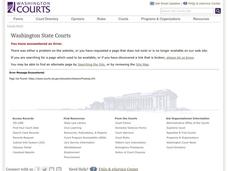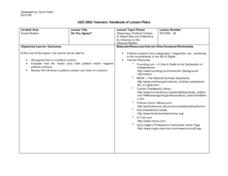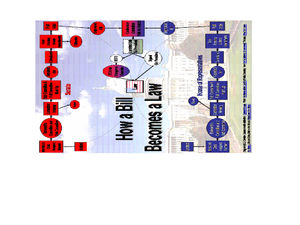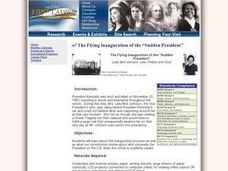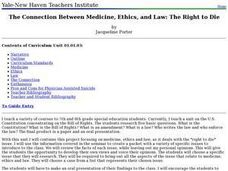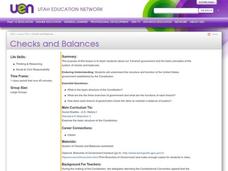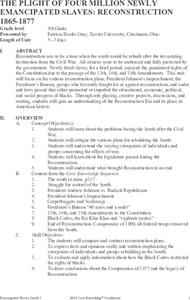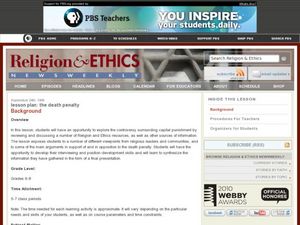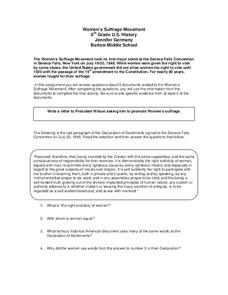Curated OER
Comparing Rights Documents
Students compare rights from the Universal Declaration of Human Rights with those in the United States Bill of Rights and Amendments. They explore reasons for the presence or absence of certain rights.
Curated OER
Government: War Powers Limitations
Students examine historic examples of authority during wartime. They interpret the Fifth Amendment. They debate the merits of the Patriot Act.
Curated OER
Freedom Of Expression In Special Places
Students learn about First Amendment rights as they pertain to school and school newspapers.
Curated OER
The Bill of Rights
Young scholars practice their reading comprehension skills by reading about the Bill of Rights. They answer questions after reading to test their comprehension.
Curated OER
Citizenship Worksheet 5 - Local and State Government
The Tenth Amendment of the United States Constitution delegates rights that have not been defined by the federal government to the states. But what are the responsibilities of state governments? What about county and city governments?...
Curated OER
Do You Agree?
Students recognize bias in a political cartoon, evaluate how the media uses both positive and/or negative political cartoons, and assess the influence a political cartoon can have on a person.
Curated OER
Landmark Supreme Court Cases and the Constitution: Reynolds v. United States (1878)
Young scholars examine the impact of court decisions. In this Supreme Court instructional activity, students read the Reynolds v. United States (1878) case study regarding first election decided by the House of Representatives....
Curated OER
How Government Works and the Rights of the People
Eighth graders identify how to be responsible citizens. For this civics lesson, 8th graders review websites of congressional members and then create questionnaires about the responsibilities of citizens.
Curated OER
Understanding the Significance of the Nationalization of the Bill of Rights
Eleventh graders study the impact of the Nationalization of the Bill of Rights upon criminal law. They analyze opposition to expansionist viewpoints that could possibly create more checks and balances on the state courts and analyze...
Curated OER
An Introduction To The Bill Of Rights
Young scholars learn about the Bill of Rights and how they apply to modern day situations.
National First Ladies' Library
The Flying Inauguration of the "Sudden President
Students study the inauguration process as well as what the constitution states about who succeeds the President of the US when the office is emergently vacant. They discuss the role of government and the events leading to Lyndon...
Curated OER
The Connection Between Medicine, Ethics, and Law: The Right to Die
Students in a special education class examine the United States Constitution. Using the text, they answer five research questions and discuss the amendments that concern medicine, ethics and law of the right to die issue. They develop...
Curated OER
You and the Law -- Beating the Odds
Middle schoolers examine the rate of institutional racism in the United States. Individually, they write in their journals about how they can make better choices and increase their self-esteem. Using historical documents, they identify...
Curated OER
Checks and Balances
Eleventh graders explain the structure and function of the United States government established by the Constitution. They set up a make-believe scenario: the 3 volunteers have been friends for a long time and have formed a club (the...
Curated OER
The Plight of Four Million Newly Emancipated Slaves: Reconstruction - 1865-1877
Students study the Reconstruction Era after the US Civil War. In this Reconstruction lesson set, students examine the problems that were encountered by the South after the Civil War, look at different plans for Reconstruction, and...
Curated OER
Photographs of the 369th Infantry and African Americans during World War I
Students engage in a discussion regarding images of war we see, how quickly do we see them, and how they affect us? They view and analyze war photographs taken during World War I.
Curated OER
Justice Demands an End to Segregation, But it Does Not End
Students define human rights and describe how it applies to politics, economics and cultural rights. As a class, they watch a video how the Constitution was made and discuss its purpose. In groups, they present information to the class...
Curated OER
The Death Penalty
Eleventh graders perform a study of the rights guaranteed by the Bill of Rights and focus on the protection against cruel and unusual punishment in the Eighth Amendment as it relates to the death penalty. Prior to formulating a...
Judicial Learning Center
American Equality Milestones
Has equality always existed as an unalienable right in the United States? Use this worksheet to chronicle the history and progression of equality in major documents and speeches throughout American history. The graphic organizer asks...
Curated OER
Women’s Suffrage Movement
Though the movement for Women's Suffrage stretched over several decades and across two centuries, the final few years were the most difficult hurdle in many ways. Use a document-based question writing exercise to make inferences about...
NPR
Progressive Era Lesson Plan
The women working for equal rights in the early 20th century weren't a part of one large group; rather, they were members of dozens of small groups focused on social reform. Explore the ways groups in the Progressive Era like National...
Curated OER
Who are American Citizens?
Students investigate American citizenship. In this civics instructional activity, students consider the basic knowledge of U. S. government new citizens are required to have. Students also examine the 14th amendment that describes U. S....
Curated OER
The U.S. & Navajo Bills of Rights
Students are introduced to the United States and Navajo Bill of Rights. In groups, they compare and contrast the two documents and take notes to share with the class. To end the lesson, they write in their journals about their own...
Curated OER
Freedom to Worship
Fifth graders read the biographies of seven colonists and determine their position on the freedom of religion. They conduct a panel discussion of seven personalities and debate the religious freedom in America.




